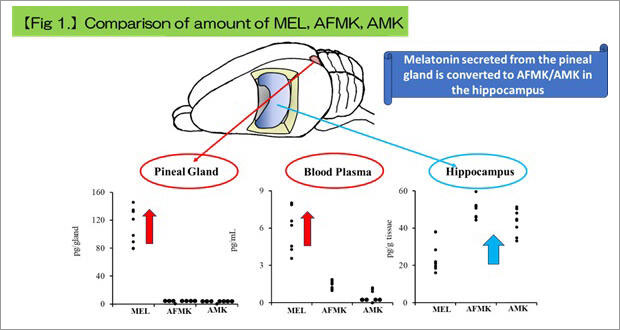Mar 14, 2024
Memory decline due to aging caused by a drastic decrease in a melatonin metabolite - Rikkyo University clarifies mechanism in mice
Keyword:RESEARCH
OBJECTIVE.
Specially Appointed Professor Atsuhiko Hattori of the Department of Sport and Wellness, College of Sport and Wellness, Rikkyo University, in collaboration with Assistant Professor Yusuke Maruyama and Professor Haruyasu Kato of the same department; Fellowship Researcher Kazuki Watanabe (Japan Society for the Promotion of Science (JSPS)) and Professor Jun Hirayama of Komatsu University; and Assistant Professor Hikaru Iwashita of Kansai Medical University, clarified that a drastic decrease in N1-acetyl-5-methoxykynuramine (AMK) in the hippocampus is one of the causes of memory decline related to aging. AMK is a melatonin metabolite in the brain involved in consolidation of short-term memories into long-term memories. The findings are expected to contribute to the development of a therapeutic drug for dementia.
To clarify synthesis of AMK in the hippocampus, the levels of melatonin, N1-acetyl-N2-formyl-5-methoxykynuramine (AFMK; the first-step metabolite of melatonin) and AMK (a metabolite synthesized from AFMK) in the pineal gland, plasma, and hippocampus were compared. The results revealed that melatonin secreted from the pineal gland reaches the hippocampus via the bloodstream and is subsequently converted to AMK in the hippocampus. Additionally, the group also investigated the genes for enzymes involved in AMK synthesis, identifying novel candidate genes.

According to Hattori, "AMK or a potential new drug based on AMK holds promise as a memory-improving drug for impairment related to aging and for mild cognitive impairment (MCI), which is considered as a pre-stage of dementia. AMK may not only improve quality of life in older adults but may also be utilized for aging pets and in the training of police dogs and guide dogs. AMK is a substance that has great potential for future use."
Journal Information
- Publication: Journal of Pineal Research
- Title: N1-Acetyl-5-methoxykynuramine, which decreases in the hippocampus with aging, improves long-term memory via CaMKII/CREB phosphorylation
- DOI: 10.1111/jpi.12934
This article was published in "Science Japan /Japan Science and Technology Agency" on March 14th.